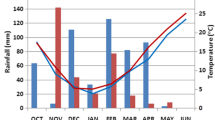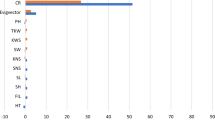Summary
Twenty-one germplasm accessions and breeding lines of einkorn wheat (Triticum monococcum ssp. monococcum and ssp. sinskajae) were grown at two sites in Italy and evaluated for various field and seed characteristics. Grain yields of germplasm accessions were relatively high (317–3238 kg/ha), but distinctly lower than those of four modern cultivars of tetraploid (T. turgidum ssp. durum) and hexaploid wheat (T. aestivum ssp. Aestivum) included in the experiments as controls. As expected, all Einkorns-including some substantially higher yielding crossbred lines (3415–4362 kg/ha)-were defective for one or more agronomically relevant features. However, a few of the accessions examined were found to contain, as a group, practically all the genes needed to breed monococcums having the main field attributes of a modern wheat cultivar: high yielding capacity, good threshability, large kernel size, earliness, short stature and adequate lodging resistance. Still higher yielding diploid wheats, more responsive to improved growing conditions and of better seed quality, could probably be obtained from crosses with wild monococcums bearing mostly two-seeded florets and with accessions producing less slender-shaped kernels. Some of the Einkorns examined were found to carry minor genes for easy threshing which might enhance the efficacy of the major gene for soft glumes carried by T. monococcum ssp. sinskajae, a partially free-threshing diploid wheat taxon. Seed protein percentage of monococcums was markedly higher than that of durum and bread wheat cultivars even in those cases where their grain yields surpassed those of the polyploid checks. The possibilities offered by diploid wheat in the exploitation of novel endosperm mutants and F1 hybrid vigour, as well as in the fields of celiac disease, crop diversification and resistance to agro-biological stresses are discussed. Breeding priorities and strategies are also proposed.
Similar content being viewed by others
References
Auricchio, S., G.DeRitis, M.DeVincenzi, P.Occorsio & V.Silano, 1982. Effects of gliadin-derived peptides from bread and durum wheats on small intestine cultures from rat fetus and coeliac children. Pediatr. Res. 16: 1004–1010.
Blanco, A., B.Giorgi, P.Perrino & R.Simeone, 1990. Risorse genetiche e miglioramento della qualita del frumento duro. Agricultura e Ricerca 12: 41–58.
Castagna, R., 1991. Frumento monococco: caratterizzazione genetica ed agronomica. L'Inf. Agr. 37: 79–81.
D'Egidio, M.G., S. Nardi & V. Vallega, 1991. Quality of diploid wheat, Triticum monococcum L. In: D.J. Martin & C.W. Wrigley (Eds). Proc. Cereals International Conf. p. 205–208. Brisbane, Australia 1991.
Favret, E.A., J.L. Cervetto, R.M., Solari, A. Bolondi, H. Nunez, L.E. Manghers, A. Boffi & J.P. Ortiz, 1984. Influencia de la ploidia del trigo en la induccion de la enfermedad celiaca. p. 13. Proc. Seventh Meeting Latin-American Soc. Pediatr. Gastroenterology and Nutrition, Buenos Aires, Argentina 1984.
Favret, E.A., J.L. Cervetto, R.M. Solari, A. Bolondi, L.E. Manghers, A. Boffi & J.P. Ortiz, 1987. Efecto comparativo de trigos diploide, tetraploide y hexaploide sobre el intestino delgado de pacientes celíacos. p. 13. Proc. Eight Meeting Latin-American Soc. Pediatr. Gastroenterology and Nutrition, Sao Paolo, Brazil 1987.
Feldman, M., 1976. Wheats. In: N.W.Simmonds (Ed). Evolution of crop plants. p. 121–128. Longman, London.
Filatenko, A.A. & U.K.Kurkiev, 1975. A new species — Triticum sinskajae A. Filat et Kurk. (in Russian). Trudi po Prikladnoi Botanike, Genetike i Selektsii 54: 239–241.
Hammer, K. & P.Perrino, 1984. Further information on farro (Triticum monococcum L. and T. dicoccon Schrank.) in South Italy. Kulturpflanze 32: 143–151.
Harlan, J.R. & D.Zohary, 1966. Distribution of wild wheats and barley. Science 153: 1074–1080.
Johnson, V.A. & P.J. Mattern, 1975. Improvement of the nutritional quality of wheat through increased protein content and improved amino acid balance. p. 191. Report of research findings 1 Jan. 1973–3 Mar. 1975.
Kuckuck, H., 1970. Primitive wheats. In: O.H.Frankel & E.Bennett (Eds). Genetic resources in plants-their exploration and conservation. p. 249–266. Blackwell Scientific Publications, Oxford and Edinburgh.
Multani, D.S., H.S.Dhaliwal, S.K.Sharma & K.S.Gill, 1989. Inheritance of isoproturon tolerance in durum wheat transferred from Triticum monococcum. Plant Breeding 102: 166–168.
Navruzbekov, N.A., 1978. Inheritance of grain husk content and brittleness of the ear axis in F1 interspecific hybrids of wheat (in Russian). Byulletin Vsesoyuznogo Ordena Lenina i Ordena Druzhaby Narodov Instituta Rastenievodstva Imeni N.I. Vavilova, Nr. 78, 12–13.
Sharma, H.C., J.G.Waines & K.W.Foster, 1981. Variability in primitive and wild wheats for useful genetic characters. Crop. Sci. 21: 555–559.
The, T.T., 1976. Variability and inheritance studies in Triticum monococcum for reaction to Puccinia graminis f. sp. tritici and P. recondita. Z. Pflanzenzuechtung 76: 287–298.
Vallega, E., 1977. Validità del Triticum monococcum nel miglioramento genetico del frumento. Sementi Elette 23: 3–8.
Vallega, V., 1978. Search of useful genetic characters in diploid Triticum spp. In: S. Ramanuyan (Ed). Proc. Fifth Intern. p. 156–162. Wheat Genet. Symp., New Delhi, India 1978.
Vallega, V., 1979. Field performance of varieties of Triticum monococcum, T. durum and Hordeum vulgare grown at two locations. Genet. Agr. 33: 363–370.
Vallega, V., 1991. Triticum monococcum. Ann. Wheat News-letter 37: 74–77.
Waines, J.G., 1983. Genetic resources in diploid wheats: the case for diploid commercial wheats. In: S. Sakamoto (Ed). Proc. Sixth Intern. p. 115–122. Wheat Genet. Symp., Kyoto, Japan, 1983.
Waines, J.G., B.Ehdaie & D.Barnhart, 1987. Variability in Triticum and Aegilops species for seed characteristics. Genome 29: 41–46.
Author information
Authors and Affiliations
Rights and permissions
About this article
Cite this article
Vallega, V. Agronomical performance and breeding value of selected strains of diploid wheat, Triticum monococcum . Euphytica 61, 13–23 (1992). https://doi.org/10.1007/BF00035542
Received:
Accepted:
Issue Date:
DOI: https://doi.org/10.1007/BF00035542




